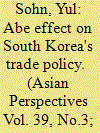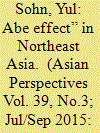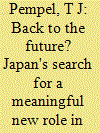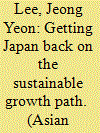|
|
|
Sort Order |
|
|
|
Items / Page
|
|
|
|
|
|
|
| Srl | Item |
| 1 |
ID:
140688


|
|
|
|
|
| Summary/Abstract |
In this article, I show how Prime Minister Abe Shinzo has promoted two major national and international economic policies—Abenomics and Japan’s involvement in the Trans-Pacific Partnership— by focusing on his administration’s domestic political struggles. Both agendas become significant in the face of China’s regional engagement, demonstrating the inextricable ties between international affairs and domestic politics, a combination essential for grasping the “Abe effect” in foreign policy. KEYWORDS: Abenomics, TPP, decisionmaking process, agricultural reform in Japan.
|
|
|
|
|
|
|
|
|
|
|
|
|
|
|
|
| 2 |
ID:
140694


|
|
|
|
|
| Summary/Abstract |
Prime Minister Abe Shinzo’s decision to enter talks on the TransPacific Partnership (TPP) has been a game changer in the competition over Asia Pacific free trade agreements (FTAs). His move helped to create a space for multilateral, mega-FTA competition before South Korea could fully prepare and implement its “global FTA hub strategy” predicated on bilateral deals. In this article, I provide an overview of South Korea’s evolving strategies toward FTAs and explore how it has responded to the “Abe effect.” My focus is on two challenges for South Korea in participating in the TPP: US geopolitical pressure once Japan entered negotiations, and the de facto FTA negotiations with Japan under the TPP. Dealing with Japan is an especially tall order given the troubled history of South Korea–Japan economic and political relations. KEYWORDS: Korea-Japan relations, TPP, Abe Shinzo, hub strategy, security-economy nexus.
|
|
|
|
|
|
|
|
|
|
|
|
|
|
|
|
| 3 |
ID:
140683


|
|
|
|
|
| Summary/Abstract |
IN DECEMBER 2012 ABE SHINZO RETURNED TO POWER AFTER FIVE years in the political wilderness. Since taking office he has solidified his political leadership by winning all successive elections, paving the way to becoming one of the longest tenured premiers in postwar Japan. His security and foreign policies have already changed the landscape of international relations in East Asia as Tokyo’s relations with Seoul and Beijing spiraled down to new lows for the post–Cold War era. Abe’s new security policy, under the slogan “Proactive Contribution to Peace,” helped bring the Japan-US alliance to an unprecedented level of closeness, clearly pitted against China. The Abe government is also potentially challenging the China-centered new economic order by promoting the US-led Trans-Pacific Partnership (TPP) trade network. Abe’s decision to enter the TPP talks became a game changer in the race for free trade agreements in Asia and the Pacific.
|
|
|
|
|
|
|
|
|
|
|
|
|
|
|
|
| 4 |
ID:
140684


|
|
|
|
|
| Summary/Abstract |
“Is Japan back?” Economically, the evidence is mixed at best due largely to slowness in carrying out vital structural reforms. In electoral terms, the Liberal Democratic Party has regained much of its prior dominance under Abe Shinzo. Most problematic of all, Japan is not back at all in regaining a commanding position within East Asia, in part due to its slow economic transformation, but due also to the atavistic positions taken by Abe’s government on the historical interpretations of Japanese behavior in World War II. KEYWORDS: Abe, Abenomics, structural reform, Liberal Democratic Party, Asian regionalism.
|
|
|
|
|
|
|
|
|
|
|
|
|
|
|
|
| 5 |
ID:
140691


|
|
|
|
|
| Summary/Abstract |
Over the past two years since Xi Jinping and Abe Shinzo came to power, the bilateral relationship between China and Japan has been deteriorating steadily. China’s perception of Abe’s foreign policy orientation has been very negative. At the same time, China’s response to it has also been very tough and assertive. At least four factors may account for China’s attitude and behavior: China’s rise, domestic politics, historical memory, and leadership personality. KEYWORDS: China, Japan, Sino-Japanese relations, East Asia security.
|
|
|
|
|
|
|
|
|
|
|
|
|
|
|
|
| 6 |
ID:
140697


|
|
|
|
|
| Summary/Abstract |
examine the Koizumi Junichiro era in Japan to derive lessons for the current Abe Shinzo administration that vows to get Japan back on the path of sustainable growth. Standard growth theory identifies total factor productivity (TFP) as the key to sustainable growth. The existing empirical evidence clearly indicates that economic recovery during Koizumi's tenure was accompanied by robust growth of TFP. To account for this improvement in TFP performance, I focus on three developments during Koizumi's term: promotion of competition by introducing market discipline to various sectors of the economy, effectiveness of market entry and exit, and use of foreign competitive pressure to enhance domestic efficiency.
|
|
|
|
|
|
|
|
|
|
|
|
|
|
|
|
| 7 |
ID:
140695


|
|
|
|
|
| Summary/Abstract |
Japan's response to the global HIV/AIDS crisis in the 1980s was lukewarm, due mainly to the absence of a domestic perception of AIDS as an immediate threat. The key determinants of that perception were rare cases of AIDS infections in Japan, a detrimental media role, and weak civil society. Japanese media contributed to shaping a flawed image of AIDS as a foreign disease or a disease of homosexuality and promiscuity. Moreover, civil society organizations were not strong enough to create momentum for reformulating the distorted perception or catalyzing specific policies. Not until the early 1990s did Japan's global AIDS funding increase. The policy shift was in tandem with the rising influence of newly emerged civil activist groups.
|
|
|
|
|
|
|
|
|
|
|
|
|
|
|
|
| 8 |
ID:
140693


|
|
|
|
|
| Summary/Abstract |
The severe deterioration in South Korea–Japan relations under Abe Shinzo and Park Geun-hye seems paradoxical given that Abe’s grandfather, Kishi Nobusuke, and Park’s father, Park Chung-hee, were “close friends” who helped forge Japan–South Korea normalization in 1965. However, Abe and Park are better understood as operating within the nationalist conservative logic that brought their families together but now drives their countries apart. KEYWORDS: Korea-Japan relations, Kishi Nobusuke, Abe Shinzo, Park Chung-hee, Park Geun-hye, Manchukuo, Korea-Japan normalization, conservative nationalism.
|
|
|
|
|
|
|
|
|
|
|
|
|
|
|
|
| 9 |
ID:
140690


|
|
|
|
|
| Summary/Abstract |
In this article, I provide an overview of the major security and defense changes achieved by the second Abe Shinzo cabinet and analyze why Abe was reasonably successful. Based on analysis of the major Japanese strategic guidelines, the new National Security Council, and legal arguments on interpretations of the constitution, I argue that Abe’s security and defense reforms are not unique to his ideology or political stance but follow the general trend Japan has pursued in the last two decades. What is unique about Abe is his drive and political tact to ram through these reforms. These reforms are also suited to shift Japan’s geopolitical focus away from the Asian continent and toward the Eurasian littoral and maritime areas, where Japan sees more economic and political opportunities without the historical controversies it faces in East Asia. KEYWORDS: Abe Shinzo, Japan’s constitution, collective self-defense, US-Japan defense relations.
|
|
|
|
|
|
|
|
|
|
|
|
|
|
|
|
|
|
|
|
|